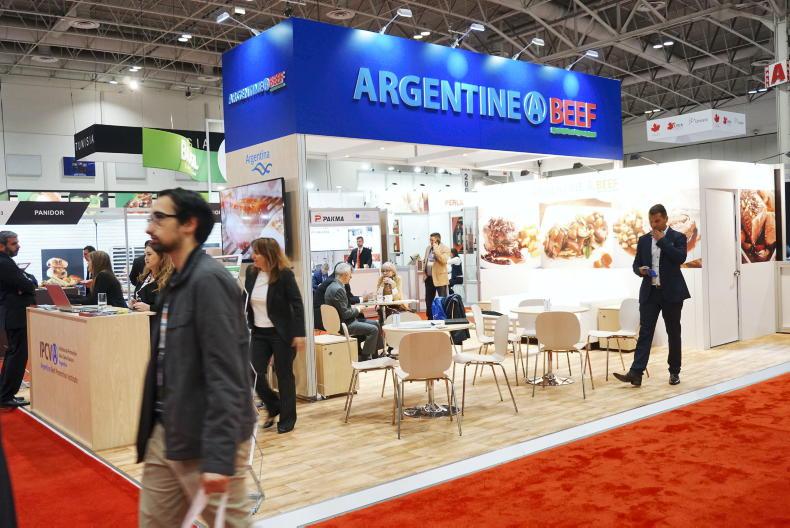The Government’s Economic and Sustainability Impact Assessment (EISA) of the Mercosur trade deal shows that it will cost Irish beef farmers between €44m and €55m annually as EU beef imports are forecast to increase by 53,000t.
The 143-page document analyses the impact the Mercosur agreement will have on the entire Irish economy.
The conclusion is that most sectors will benefit, some to a significant extent but that beef will lose out and one-third of the report is dedicated to explaining how beef loss estimates are calculated.
Mercosur beef access to the EU
The quota agreed by the EU with Mercosur just over two years ago was for an additional 99,000t of beef at a preferential tariff rate of 7.5%.
Currently, the Mercosur countries (Brazil, Argentina, Uruguay and Paraguay) have 48,876t product weight of the 66,826t Hilton quota, which has a preferential tariff rate of 20%. This will fall to zero if the Mercosur deal is approved by the EU institutions and member states and comes into effect.
Uruguay and Argentina also have access to a 45,000t tariff-free quota granted by the EU as part of settling a hormones-related dispute with the US at WTO.
Until recently, that quota was allocated on a first-come, first-served basis to the eligible countries but a renegotiation in 2019 agreed that 35,000t of this would be ringfenced for the US. This restricts access for Argentina and Uruguay while Brazil and Paraguay have never had access.
Notwithstanding this, the ESIA concludes that the Mercosur exporters are likely not to fully utilise the full 99,000t of extra quota but availing of the 48,876t of Hilton quota at zero tariff, plus 53,000 of the preferential 7.5% preferential tariff (after transition period).
The ESIA also notes the €1bn support fund announced by the then European Commissioner Phil Hogan to compensate farmers, plus the inclusion of a safeguard clause whereby imports can be restricted in weak market conditions.
The ESIA also considered the trade flows between Mercosur and the EU, plus the wider development of beef trade over the past decade.
Volumes traded increased from 7.5m tonnes annually in 2010 to 10.9m tonnes in 2019, with most of the growth in output coming from Mercosur and most of the growth in demand coming from Asia – in particular China and Hong Kong.
It is interesting how the EU is now a much less important market for Mercosur countries than it was at the start of the last decade.
In 2010, the EU took 10.3% of Mercosur exports but this had fallen to 5.4% by 2019.
Over the same time, China and Hong Kong moved from taking just 5% of Mercosur exports in 2010 to over 50% by 2019 and this has increased further since then.
Brexit
Brexit was outside the terms of reference for the study but it does recognise that an independent UK trade policy could lead to displacement of Irish beef in Britain which would then be looking to the next closest market, the EU. This is where it will come into competition with Mercosur beef.
Britain has not been a major market for Mercosur exports, taking 4%, while Germany, Italy and the Netherlands are the main markets, taking 82% between them. Netherlands is likely disproportionately high as Rotterdam is a major EU port for South American exports.
Even so, these three countries take 23% of Irish exports to the EU and Irish beef is likely therefore to face increased competition.
Comment
When the Mercosur deal was announced, it was the biggest trade threat to Irish beef production.
It remains a threat and is quantified in the Government’s ESIA at between €44m and €55m per annum. However, since then, the UK’s post-EU trade policy has become clear and the granting of virtual open-door access for beef and sheepmeat to Australia now represents an even greater greatest risk of Irish beef being displaced in the export market.
More deals like this are likely to follow and the consequence for Irish beef is that it will be looking to the EU market if displaced in the UK.
This is where the Mercosur deal will have its impact. The methodology in the report is robust but, like all forecasts, assumptions have to be made.
The current growth in Mercosur sales in Asia, particularly China and Hong Kong, means they may not be as interested in fully utilising their quota to the EU at this moment.
However, should anything happen in that market, then the EU would be back in play like it was at the beginning of this century.
Ratification
Irish farmers will also have work to do if they want to get the Irish Government to oppose ratification of the deal, given that in the wider economy exports to Mercosur will grow by €1.2bn by 2035, with €956m of this coming from the chemicals and pharmaceuticals sector.






 This is a subscriber-only article
This is a subscriber-only article










SHARING OPTIONS: